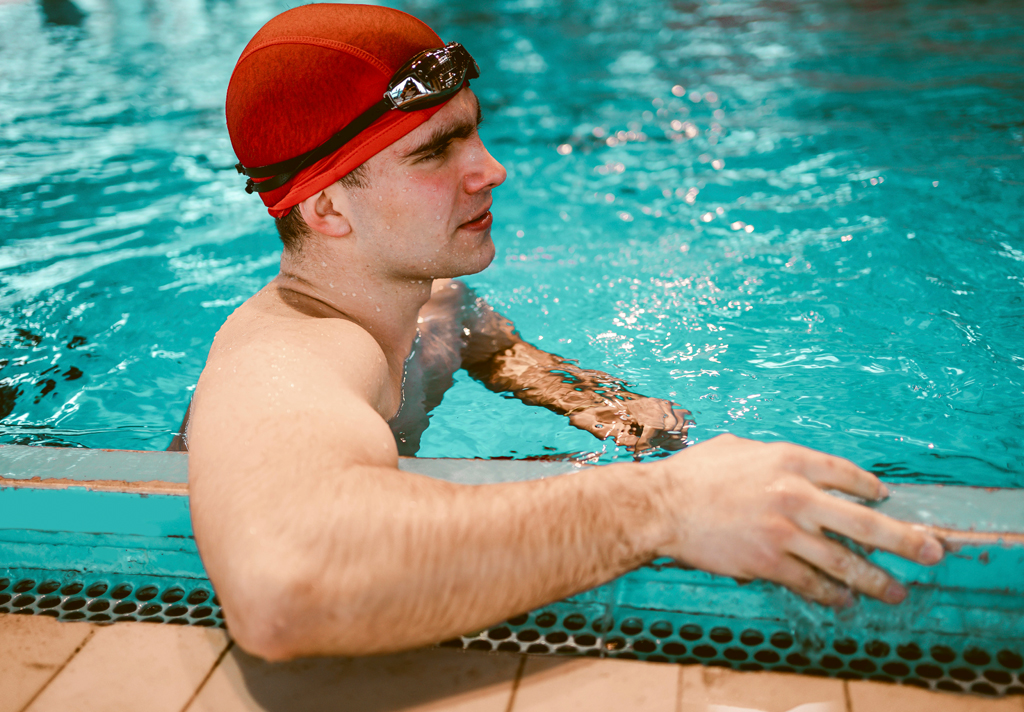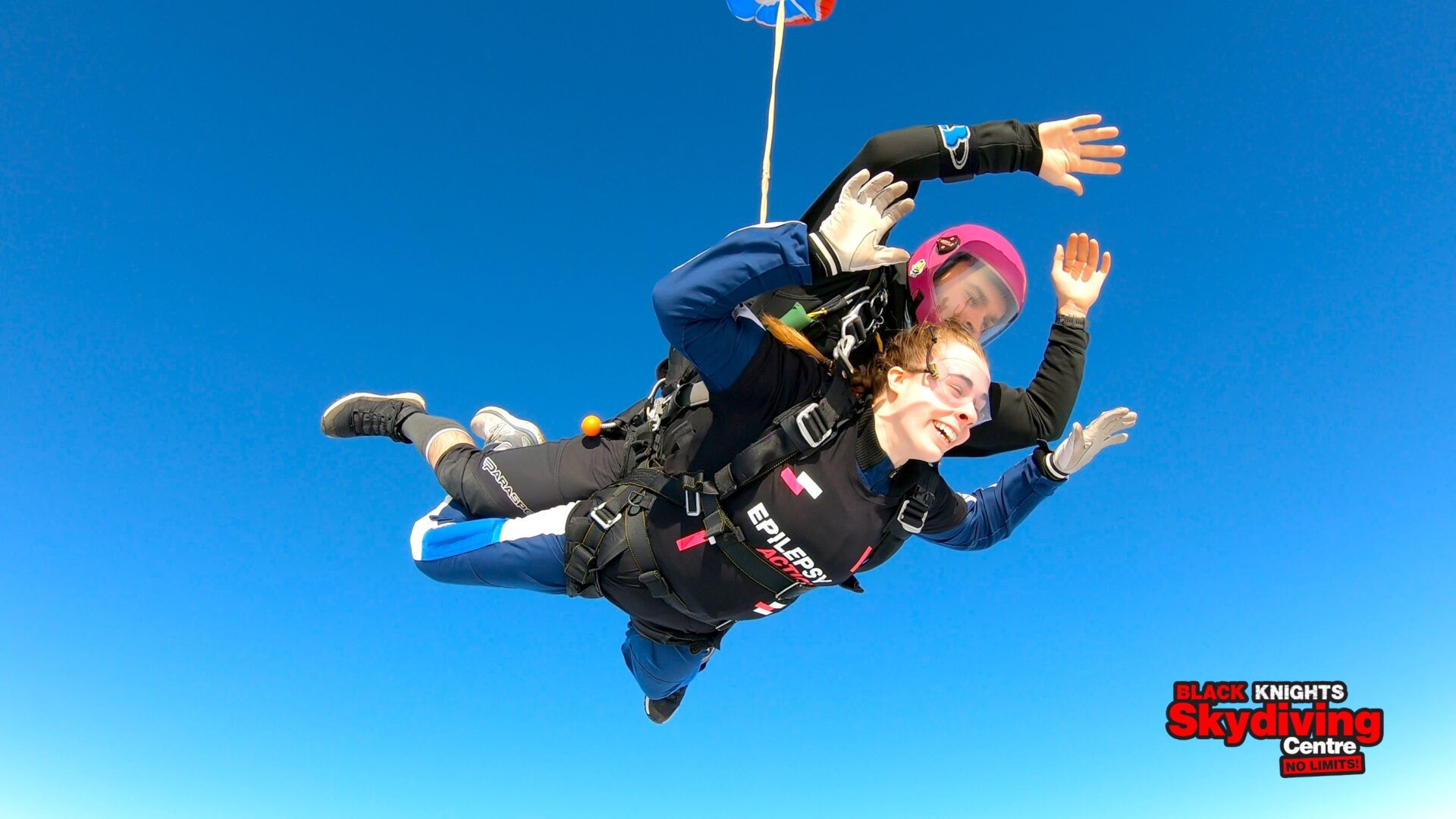Jump straight in
Key facts
- There are things you can do to reduce any risks and make activities safer for you
- Some sport activities have a governing body and rules around safety and medical conditions
- You may not need to take more safety precautions than anyone else if your seizures are completely controlled
- You may not need to tell anyone about your condition if it is unlikely to affect your safety or anyone else’s. But telling those around may be a good idea, just in case you need help
- We have some safety check questions to help you think out how to make an activity safer
Can I take part in sport, exercise, and leisure activities?
Being active and exercising can have health and wellbeing benefits for us all. But some people worry if it’s safe to take part in exercise, sport, or leisure activities with epilepsy.
Some people say when they are active they are less likely to have seizures. For others with epilepsy, exercising or taking part in sport and leisure activities can improve their symptoms.
With the right support and safety precautions, there’s no reason why you can’t take part in most activities.
The equality laws in the UK protect you from being treated unfairly because you have epilepsy. This includes access to sport and leisure activities.
Some sport activities have a governing body and rules around safety and medical conditions. We give information about regulations we know about on this webpage.
Some people feel more comfortable taking part in group activities just for people with disabilities. The NHS website has a link to find disability sports and classes near you.
Are there any things I need to avoid?
You may not need to take any more safety steps than anyone else if your seizures are completely controlled. Still, it’s always a good idea to follow the rules and recommendations around safety and equipment.
A very small number of people with epilepsy find that doing strenuous exercise increases their risk of having seizures.

How do I decide whether an activity is safe?
Many activities carry some risks, even if you do not have epilepsy. But people still do these activities. Like anyone, you might decide that the benefits of doing something outweigh the risks.
You can lower any risks related to an activity by doing a safety check and putting some safety measures in place.
You can check if there are any rules for your sport or activity below.
Some people may use the driving rules for epilepsy as a guide to help decide how safe they feel doing any particular activity. For example, you are allowed to drive if you have tonic-clonic seizures and have been seizure free for a year. On that basis, you may feel more comfortable doing certain activities.
Epilepsy Action has some safety check questions to help you work out how to make an activity safer.
You could also talk to your doctor or epilepsy specialist nurse to help you decide if something is safe enough for you.
When should I exercise?
Avoid exercising during times that you know may trigger a seizure, if possible. For example, try to avoid exercising soon after waking up if you tend to have seizures around that time. Or you might avoid exercising if you didn’t sleep well the night before.
Your doctor or epilepsy nurse can give you more advice.
Should I tell people about my epilepsy?
You may not need to tell anyone about your epilepsy if your condition is unlikely to affect your safety or anyone else’s.
Some people may feel more comfortable telling the people around them about their epilepsy. For example, you may want to tell the person leading a group activity. This may help you feel more confident in case you need any help.
If you are joining a club or doing a group activity, you could share information such as:
Our CARE video explains what to do if someone has a tonic-clonic seizure.
You may need to complete a medical form to take part in some activities, such as club sports. The organiser should only use this information to do a risk assessment and, if needed, make any reasonable adjustments.
If your club or group needs to do a risk assessment and make reasonable adjustments they should do these with you, not for you.
If you feel you are being unfairly stopped from taking part in an activity because of your epilepsy, check our information on epilepsy and your rights.
You can check any activity that’s not included on the list below by looking up their governing body or contact our helpline.
Got any questions?
Our expert advisors can help you with any questions you might have about leisure activities or anything else related to living with epilepsy.
When you’re out and about
You may want to think about wearing medical ID if you’re doing activities outside and on your own, such as jogging or rambling. It may also be a good idea to have an alarm that uses a tracking or location device. The device can alert someone if you are having a seizure and tell them where you are, just in case.
Epilepsy Action has more information on safety when you’re out and about
Information for club and group organisers
If you run a sports, exercise or leisure activity you may have people with epilepsy taking part. If so, we have lots of information to help you support them to take part safely. This includes:
- What epilepsy is
- Types of seizures
- How to perform first aid
- Doing health and safety risk assessments
Try to remember that everyone with epilepsy is different. So it is important to talk to the person about how their condition affects them and what they think you can do to support them.
Epilepsy training
We have a range of training options to help businesses, charities and other organisations support people with epilepsy in professional environments.
Sports, leisure and activities
-
Boxing
-
Climbing and bouldering
Heights could be dangerous for anyone with epilepsy. This does not mean that you shouldn’t go climbing. But you will need to think about your safety and other people’s. There is a small amount of evidence to suggest that climbing fast to a high altitude can increase the risk of someone having a seizure. A lack of sleep, exhaustion and dehydration can also increase the risk of seizures at high altitude.
Speak to your healthcare professional, such as your epilepsy nurse, before you go climbing or bouldering.
-
Cycling
Safety precautions for cycling include:
- Wearing a safe and well-fitting helmet
- Wearing high-visibility clothing
- Avoiding cycling on busy roads, rivers or canals if you still have seizures
- Trying to avoid cycling on public roads if you have seizures
Cycling UK have more general advice about cycling and safety.
-
Extreme sports
Cave diving, hang gliding, parachuting, snowboarding and bungee jumping are a few examples of extreme sports. All extreme sports involve risk. It is important to check whether it would be safe to do any of these activities if you are still having seizures. Whichever sport you choose, there is usually a governing body that sets the safety regulations.
The Epilepsy Action Helpline may be able to give more advice about these sports and organisations.
-
Fishing
If your seizures are completely controlled, you need to consider the general safety precautions for fishing. If you are still having seizures, never fish alone. Make sure the person with you knows what to do if you have a seizure. Wear a life jacket if there’s any danger of falling into the water. Using a longer line may mean you do not have to sit too near the water’s edge.
-
Flying a private plane
If you have epilepsy, you must get a medical certificate from a specialist medical examiner to be able to fly a private plane. To carry passengers you must have been seizure free for 10 years and not taken epilepsy medicines in that time. The Civil Aviation Authority has more information about medical rules for pilot licences.
-
Horse riding
Horse riding can be safe if your seizures are well controlled. If your seizures are not well controlled and could cause you to fall off the horse, you may still be able to ride. But you would need to be closely supported by someone walking alongside the horse.
Rule 49 of the Highway Code states that children under 14 must wear a helmet if they are riding on the road. Children of the Sikh religion are exempted while they are wearing a turban.
Horse riding hats and helmets are designed to protect your head against injury. So it is a good idea to wear one any time you ride a horse.
-
Jacuzzis
There is no reason why you shouldn’t use a jacuzzi if your seizures are completely controlled. If your seizures are not well controlled, you should think about the risks and have someone with you who knows how to help you if you have a seizure.
-
Martial arts
If you have seizures, it would be best to ask your doctor for advice before practising martial arts. Whatever type of martial art you choose, you should make sure that the people in charge know about your epilepsy and what to do if you have a seizure.
-
Running and jogging
If you go running or jogging, it may help to take extra safety precautions. These could include keeping to well-lit and traffic-free routes. It is best not to run by rivers or canals. Try to stick to a planned route and tell someone your route before you go.
If you are still having seizures, it might be safer to go with someone else and wear a medical ID.
-
Sauna and steam rooms
Anyone is at risk of burns if they get ill while in a sauna or steam room. If you’re still having seizures, try to go with someone who would know how to help you if you have a seizure.
-
Scuba diving
Having a seizure under water is an emergency. You and any person that tries to rescue you are at risk of drowning.
The British Sub-Aqua Club recommend that you are free from awake seizures and have not taken epilepsy medicine for five years before you go scuba diving. You will need to make an appeal to the UK Diving Medical Committee (UKDMC) if you only have seizures while asleep. They will decide if you can scuba dive.
-
Skiing
Cross-country and downhill skiing can be safe for many people with epilepsy. But you should avoid downhill skiing if you are still having seizures. This is because it would be dangerous if you had a seizure. If you are going cross-country skiing, go with someone who knows what to do if you have a seizure.
-
Sky diving (parachuting)
The British Parachute Association says you can take part in a tandem skydive (where you are attached to a professional) if:
- You have been seizure free for the last two years, and
- You have not had any changes to your medicine during this time
You will need to ask your doctor to sign a medical certificate. Skydiving on your own (solo) is not safe for people with epilepsy.
The British Skydiving website has more information about medical regulations for tandem sky diving.
-
Swimming
If your seizures are completely controlled, you don’t need to take more safety precautions than anyone else. If you are still having seizures, you need to consider some extra safety measures. For example:
- Ask your doctor or epilepsy nurse about how your epilepsy could affect your safety when swimming
- Have someone in the water with you
- Talk to the staff at your local swimming pool about any needs you may have
- Use a life jacket, float, or buoyancy aid
- You may feel more comfortable swimming near the edge of the pool
- If there is a lifeguard or pool supervisor, tell them about your epilepsy
- If there’s no qualified lifeguard, do not swim deeper than the shoulder height of the person swimming with you
- Make sure the person with you knows what to do if you have a seizure in the water and is strong enough to help you
- Practise what to do if you have a seizure, with the person swimming with you. This will boost your confidence and theirs
- Do not swim if you are feeling unwell
- Avoid overcrowded situations, as it might be difficult for others to notice if you have a seizure. You could also wear bright coloured swimwear
- Be careful if you want to swim in open water like the sea, rivers or lakes. Open water swimming is more dangerous than swimming in a pool. This is because there are other risks to think about, such as tides, currents and colder water. There is also less chance of being seen if you get into trouble. Don’t take risks
Your doctor or epilepsy nurse can give you more safety advice.
How to deal with a seizure in the water
Tonic-clonic seizures – basic guidelines:
- From behind, tilt and support the person’s head to keep their face out of the water
- If possible, move the person to shallow water until the seizure is over
- Do not restrain their movements or place anything in their mouth
- Shout for the lifeguard to help you
- Give the person their prescribed emergency medicine, if needed
- Get the person out of the water when the seizure is over
When the person is out of the water:
- Put them into the recovery position
- Keep them warm and stay with them until they have fully recovered
Absence and focal seizures – basic guidelines
Protect the person from danger by guiding them away from deep water or by holding their head above the water. When they recover, check if they need to get out of the water as they may feel confused and need to rest.
Call 999 if:
- The person may have swallowed or breathed in water, even if they appear to be fully recovered
- The seizure has not stopped after 5 minutes
- The person has more than one seizure without recovering in between
- You know it’s the person’s first seizure
- The person is injured, has breathing problems, or needs emergency medical attention for any other reason
- The person’s behaviour after a seizure is unsafe
Epilepsy Action has more information about first aid for seizures.
-
Team sports (including football, rugby, cricket and netball)
There is no evidence to suggest that you should avoid team sports if you follow safety advice for the sport. This may include wearing the right head protection, as recommended by the official sporting body. If your epilepsy was caused by a head injury, get advice from your doctor about whether these types of sport are safe for you.
-
Theme parks
You might have concerns about safety on rides. As long as there are general safety precautions in place, you do not need to avoid rides. Some attractions may involve flashing lights. You may need to avoid these or take some steps to reduce risk if you have photosensitive epilepsy.
-
Using the gym
If you have been seizure free for 12 months you should be able to use any piece of gym equipment. If you still have seizures, there may be equipment that you should not use. This is because it would not be safe for you or other people.
Many gyms have their own safety policy. Talk to the staff about your condition and ask for a safety assessment.
-
Walking
There’s no reason why having epilepsy should stop you going hiking or rambling. If you are still having seizures, it’s a good idea to go with someone who knows what to do if you have a seizure.
Walking charity Ramblers has more information about walking with epilepsy. You can also find details about local walking groups in England and Wales.
-
Water sports
You can enjoy many water sports with epilepsy if you take the right safety measures. It helps to think about:
- What risks are involved with the activity
- How your epilepsy affects you
- What the risk would be if you have a seizure
- How you could make the activity safer
Sometimes, water sports can be too risky and it may be best to avoid them. For example, it is not safe to scuba dive when you have seizures.
As a general rule, you can make water sports safer by:
- Avoiding doing any water sports on your own
- Making sure the person with you knows about your epilepsy and how to help you if needed
- Wear a life jacket if there’s a danger of falling into the water
More information on living with epilepsy

Up for a challenge?
Be a hero and raise money for the thousands of people and families affected by epilepsy.



